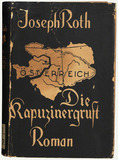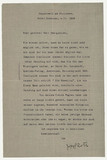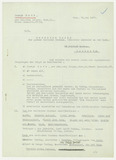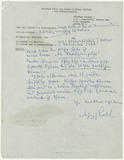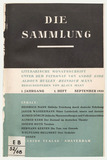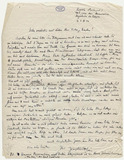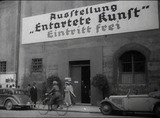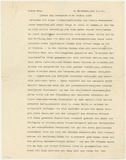Joseph Roth: Der Antichrist, first edition (1934)
At the beginning of September 1934, the publisher Allert de Lange published Joseph Roth’s cultural-philosophical book Der Antichrist (published in English as the Antichrist). Roth, who had originally agreed with the publisher to a different project with the title “Die Juden und ihre Antisemiten” (“The Jews and their Anti-Semites”), which he abandoned in the end, began to work on Antichrist in January.
Joseph Roth: Die Kapuzinergruft, first edition of the novel (1938)
In the novel Die Kapuzinergruft [The Emperor's Tomb, 1938] by writer Joseph Roth, the end of the Danube Monarchy is described from the perspective of the nobleman Franz Ferdinand Trotta. He is unable to cope with the new world order and escapes into nostalgic mourning for the “old world”.
Joseph Roth: Letter to Moshe Yaakov Ben Gavriel, November 4, 1933
Already months before the National Socialists‘ rise to power, the author Joseph Roth predicted the fate of those who would oppose the new regime. As a result, he left Germany in early 1933.
Joseph Roth: Questionnaire filled out for the American Guild for German Cultural Freedom (31 May 1937)
The question under item e) on the American Guild for German culture freedom questionnaire reads: “What facts, events or private convictions lead you to consider yourself among German exiles?” Joseph Roth's answer is, “Neither burnt nor banned, but has effected his own ban in Germany by writing an article about Hitler entitled Ich verzichte [I Abstain (ed. trans.)]”.
Joseph Roth: Report to the American Guild for German Cultural Freedom (presumably August 1938)
The writer and journalist Joseph Roth corresponds from his exile in Paris about the completion of his work Die Kapuzinergruft [The Emperor's Tomb, 1938, published in English in 1984]. Roth was one of the first scholars of the German Academy in Exile, each of whom received a monthly working scholarship of 30 dollars.
Journal Die Sammlung (Issue 1 / September 1933)
Die Sammlung was established in September 1933 by Klaus Mann, who – for some time without pay – functioned as the publisher of this literary monthly. A total of 24 issues were published by Querido Verlag Amsterdam under the auspices of André Gide, Aldous Huxley and Heinrich Mann.
Józef Wittlin: Letter to Hermann Kesten (2 November 1940)
On 31 October 1940, the Polish writer Józef Wittlin arrived with his family in Lisbon. There he made contact with Hermann Kesten, whose initiative it had been to place him on a list for an emergency visa from the Emergency Rescue Committee.
Julien Bryan: Documentary film Entartete Kunst (Degenrate Art), Munich (1937)
The 16-minute documentary Inside Nazi Germany was broadcast as part of the US newsreel The March of Time on 20 January, 1938. Most of the images were created by the documentary filmmaker Julien Bryan, who went to Germany for seven weeks in 1937 to film and take photographs of everyday and cultural life.
Klaus Mann, letter to Steinberg Verlag, December 1948
Andre Gide and the Crisis of Modern ThoughtAndré Gide was one of Klaus Mann's early literary inspirations, possibly even the lodestar of his literary life, as Mann himself makes clear in his eminently readable autobiography Der Wendepunkt (“The Turning Point”, 1952): “What he had to offer me, what drew me to him, was a kind of moral, intellectual ‘authorisation’: a spiritual legitimation and artistic objectification of my subjective restlessness and uncertainty.” Mann’s lifelong – albeit extremely one-sided – admiration of Gide’s work and character, which in Mann’s view embodied the essence of the good European, was expressed in several essays and culminated in the monograph André Gide and the Crisis of Modern Thought, initially published in English by New York publishing company Creative Age in 1943.
Klaus Mann: Correspondence with Gottfried Benn (1933)
In February 1933, only a few weeks after Hitler had been appointed Chancellor (Reichskanzler), Klaus Mann’s uncle, Heinrich Mann, had been put under political pressure and forced to resign from the Prussian Academy of the Arts. Gottfried Benn (1886-1956) was appointed as acting President of the Poetry Department; this poet was one of only very few artists of standing who remained in the institute which had been “gleichgeschaltet” (brought into line with Nazi doctrine).


